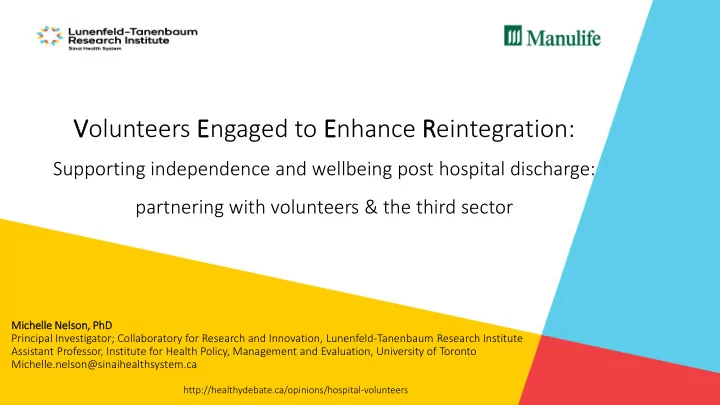

Volunteers Engaged to Enhance Reintegration: Supporting independence and wellbeing post hospital discharge: partnering with volunteers & the third sector Mich Michell lle Ne Nels lson on, PhD hD Principal Investigator; Collaboratory for Research and Innovation, Lunenfeld-Tanenbaum Research Institute Assistant Professor, Institute for Health Policy, Management and Evaluation, University of Toronto Michelle.nelson@sinaihealthsystem.ca http://healthydebate.ca/opinions/hospital-volunteers
Why Volu lunteers? “Human resources for health include individuals working in the private and public sectors, those working full-time or part-time, those working at one job or holding jobs at two or more locations, and those who are paid or or provide services on a volunteer basis is . ”(WHO, 2009) http://healthydebate.ca/opinions/hospital-volunteers
Why Volu lunteers? • Many third sector organizations are already providing support focused on promoting independence at home. • Help at Home Services • Home from Hospital Programs (e.g. Red Cross, RVS, AgeUK) • Care Coordination (see: Abendstern et al, 2018) • Social Prescribing (e.g. Elemental) Despite increase attention to the third sector, and increasing participation in the provision of services, we do not have a strong empirical understanding of the role of the NGOs/volunteers in the delivery of ‘public’ services. 3
Stu tudy Rationale Patients vulnerable at Volunteers ‘humanize’ IADL support and social health care environments discharge - “post isolation are key issues, and hospital syndrome” but contributions to people do not want to patient experience & (Krumholz, 2014) with ‘burden’ family, friends and outcomes are ongoing support neighbors (Nelson et al). needs (medical, understudied (Beryl Institute, 2016). social). http://healthydebate.ca/opinions/hospital-volunteers
http://healthydebate.ca/opinions/hospital-volunteers
Program Comparison • IADLs support and/or social isolation as inclusion criteria • A small number of volunteers support large numbers of clients • High Degree of Variability Types of Support → Assessment of support needs • ‘purpose built’ or evolved program Inter-Sectoral → Risk assessments Navigation • services provided → Signposting to services and resources → Shopping • funding and staffing levels → Light housework Instrumental → Collecting prescriptions • Evaluation and ‘outcomes of interest’ Activities of → Transportation to appointments Daily Living → Gardening → Meal preparation Social and → Befriending Emotional → Peer support → Caregiver support Support 6 http://healthydebate.ca/opinions/hospital-volunteers
Programmatic Common Elements
Key Program Attrib ibutes and Valu lue “It gave me peace of mind… Because I just knew that GG runners assessed the achievement of they would send you someone that you could trust.” positive outcomes for their ‘coaches’: (Client 1, Age UK) Improved mental wellbeing, (self reported) And the family is always pleased to see that you are ability to stay in their own house longer; and going to make sure that their relative is looked after inspiration to take up new activities and safe.” (Volunteer).” ‘Safety (Evaluation Report). Net’ Home from Hospital Services reported: Psycho- “One client had been discharged and • Socia Soc ial Decreased falls, lower rates of was still a bit confused. So I made a Support Sup readmission, increased attendance at few calls to make sure that she had scheduled appointments, and timely the supports re-established. Bridgin Brid ing signposting to community agencies. Imp Improved I just wish I could have helped before the he Ga Gap Ou Outcomes she was discharged “ (Volunteer Coordinator ).
Strengths and Chall llenges Strengths • Leverages the unique contributions of volunteers and voluntary sector • Skilled volunteers can have a positive impact on older adults’ experiences • May be a cost effective approach to support at home (Bauer et al, 2016) • Reduces perceived burden on social network • Evaluation suggest some impact on readmission rates and positive health outcomes Challenges • Approach is dependent on collaboration between health, social and voluntary sectors • ‘Professionalization of Volunteers’ – may reduce the benefit of volunteer/patient interaction • Overlap with paid roles and unionized environments • Program set up requires dedicated resources
Program Benefits Client, Family, Volunteer, & System • A comprehensive risk assessment • Personalized services to meet actual needs • Increased confidence going home from hospital • Peace of mind - volunteers had been ‘vetted’ • Reduced social isolation, loneliness and improved life satisfaction • Reduced stress for caregivers • Decreased missed medical appointments • Reduced readmission rates Ben enefit its for Volu lunteers Sense of connection to community – “ giving back” Psychological benefits of volunteerism Primary Prevention? 10
Conclusions • Volunteer Supported CRP are a promising interventions • Programs must be ‘ personaliz- able’ - start prior to discharge. • Programs should be developed collaboratively (health, social and voluntary sectors) and funding should follow correspondingly (no task shifting) • Service requires organizational commitment, skilled program managers and knowledgeable volunteers. • Barriers to volunteer engagement with vulnerable populations - risk, privacy, liability, confidentiality - can be reduced with policies, education and training. 11
Next Steps – The DASH Program The DASH Program is our corresponding integrated care program designed to support improved community reintegration (focusing on both patients and their caregivers). Implementation sites are being recruited.
Jo Join in our r Th Thir ird Se Sector in in In Integrated Care Network! Join Us! SIG Meeting at ICIC19 Tuesday April 2nd @ 8 am Twitter: @voluncaring http://healthydebate.ca/opinions/hospital-volunteers
Thank you! http://healthydebate.ca/opinions/hospital-volunteers 15
Recommend
More recommend